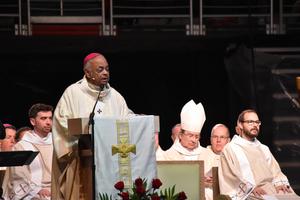Archbishop Gregory Invited to JPII Shrine Trump Event Days Before Public Statement
In correspondence dated May 30th and obtained by CNA, Archbishop Gregory’s office declined “the kind invitation to attend the event celebrating International Religious Freedom on Tuesday, June 2, 2020 at the Saint John Paul II Shrine.“

WASHINGTON, D.C. — The White House said Sunday that Washington’s archbishop was invited to attend an event with President Donald Trump several days before it took place, amid media reports that the archbishop did not learn of the event until it was announced publicly the night before it took place.
White House deputy press secretary Judd Deere told CNA June 7 that “Archbishop Gregory received an invitation to the President’s event at the St. John Paul II Shrine the week prior to the President’s visit. He declined due to other commitments.”
Correspondence between Archbishop Wilton Gregory's office and the White House indicates the same.
In correspondence dated May 30th and obtained by CNA, Archbishop Gregory’s office declined “the kind invitation to attend the event celebrating International Religious Freedom on Tuesday, June 2, 2020 at the Saint John Paul II Shrine.“
The correspondence further stated that the archbishop had “a prior commitment on his schedule at Catholic University and unfortunately must decline,” and added that Archbishop Gregory had personally conveyed his regrets at being unable to attend when he spoke to a member of the White House staff directly on the evening of Friday, May 29.
Crux reported June 7 that Archbishop Gregory had not been told of the visit until June 1, when it was publicly announced by the White House.
Trump’s June 2 visit to the shrine has been the subject of considerable controversy.
On the day of Trump’s visit, the shrine said that the White House had “originally scheduled this as an event for the president to sign an executive order on international religious freedom.”
The visit was cut into a shorter event following Trump’s controversial visit the night before to St. John’s Episcopal Church, adjacent to the White House.
Trump stood outside that church in front of cameras holding a Bible in one hand in an apparent photo-op. The church had suffered fire damage during protests on Sunday night.
Before the president arrived at the episcopal church, crowds had stood across from Lafayette Square behind the White House, protesting the death of George Floyd and police brutality. Those demonstrators were cleared from the square by police shooting pepper balls and other non-lethal weapons, before Trump walked across the square to visit the church.
On June 2, before Trump arrived at the John Paul II Shrine, Archbishop Gregory issued a statement denouncing the visit.
.@WashArchbishop Gregory has released a statement on the president's visit to the Saint John Paul II National Shrine.https://t.co/46g9Ac8Wy5 pic.twitter.com/d1wERIoLVp
— DC Archdiocese (@WashArchdiocese) June 2, 2020
“I find it baffling and reprehensible that any Catholic facility would allow itself to be so egregiously misused and manipulated in a fashion that violates our religious principles, which call us to defend the rights of all people even those with whom we might disagree,” the archbishop wrote.
“Saint Pope John Paul II was an ardent defender of the rights and dignity of human beings. His legacy bears vivid witness to that truth. He certainly would not condone the use of tear gas and other deterrents to silence, scatter or intimidate them for a photo opportunity in front of a place of worship and peace,” Gregory added.
The White House soon responded to the archbishop; Deere told the Washington Post that “It’s shameful for anyone to call themselves a person of faith yet question the President’s own deeply-held faith or motives for going to mark an important milestone for Catholics.”
"President Trump’s visit gave comfort and hope to Catholics in this country and all over the world that this President is a man of God who will always protect the sanctity of life and promote religious freedom.”
On June 5, Archbishop Gregory addressed the controversy during an online panel sponsored by Georgetown University.
“That shrine is a holy place because of the man that it honors,” Gregory said, and it never should have been used as a “political statement.”
After some Catholics criticized Archbishop Gregory’s outspoken response, he said Friday that he found the reactions “reminiscent, in my mind, to the criticism that people gave to Catholic priests and nuns that they saw marching during the civil rights period.”
The Archdiocese of Washington has not responded to requests for comment from CNA.
- Keywords:
- archbishop gregory
- george floyd
- jpii shrine
- racism
- trump

















